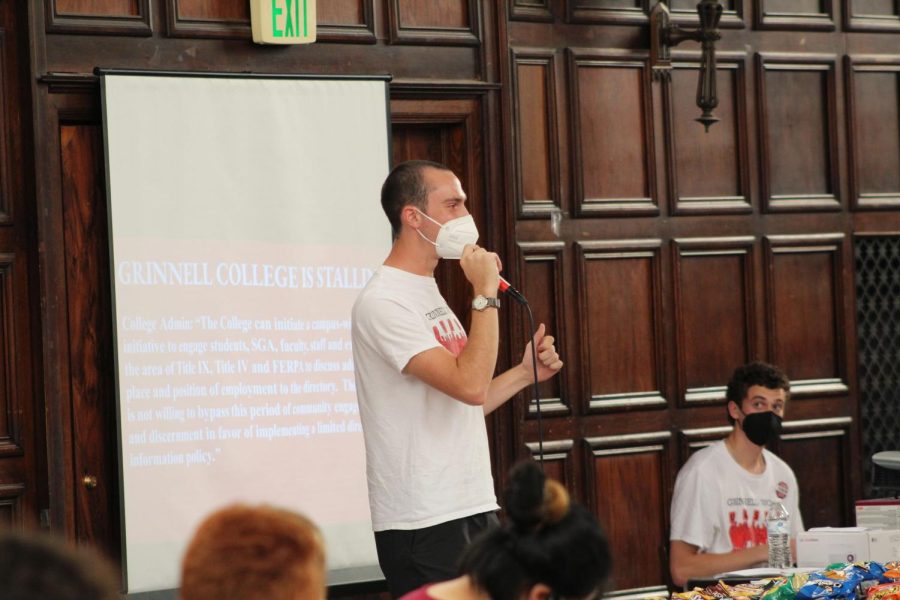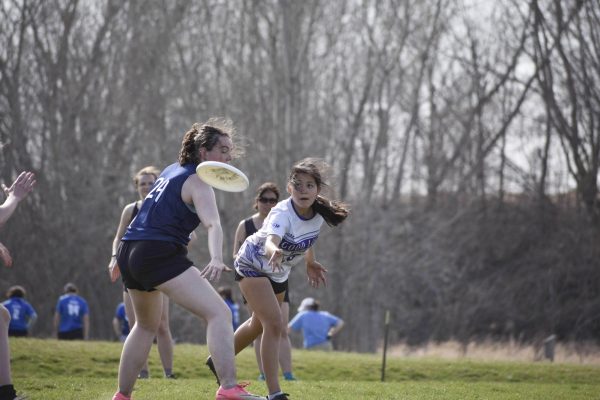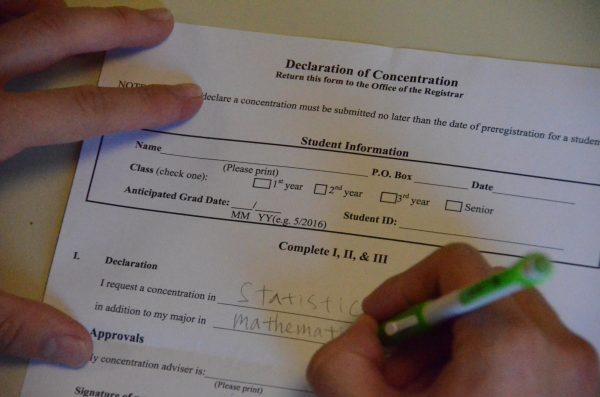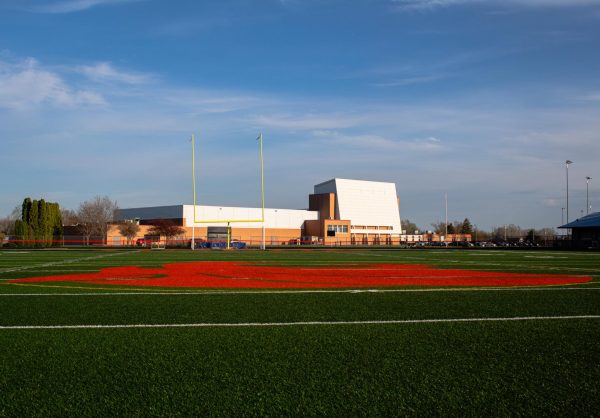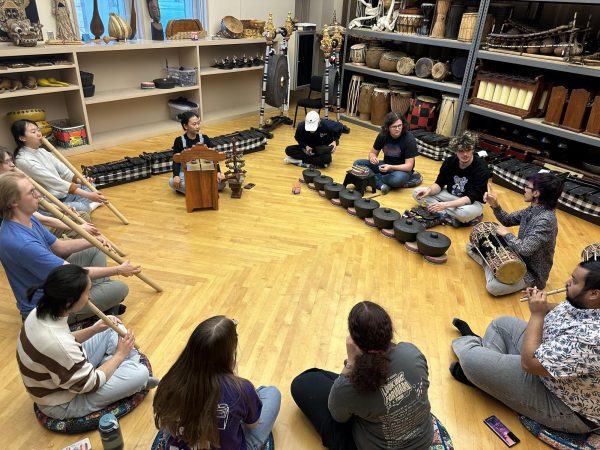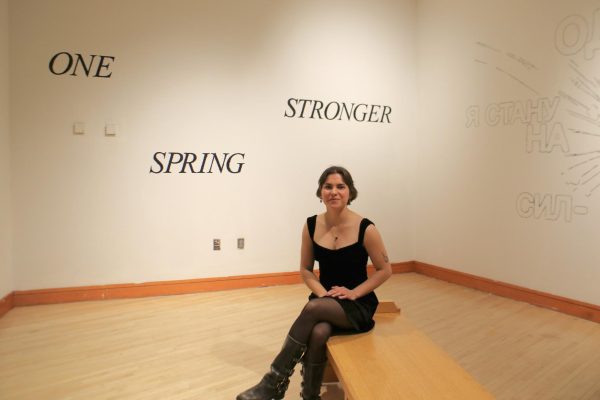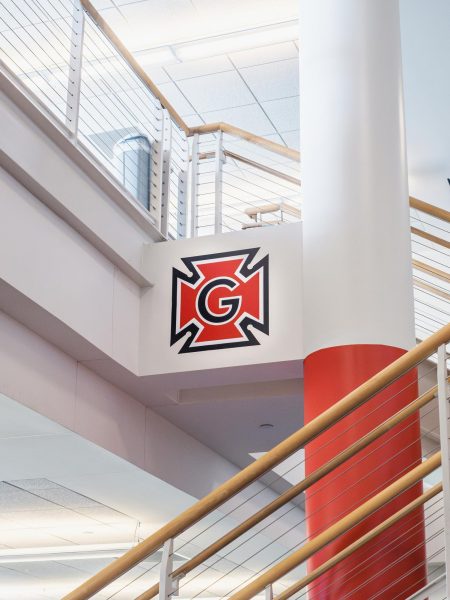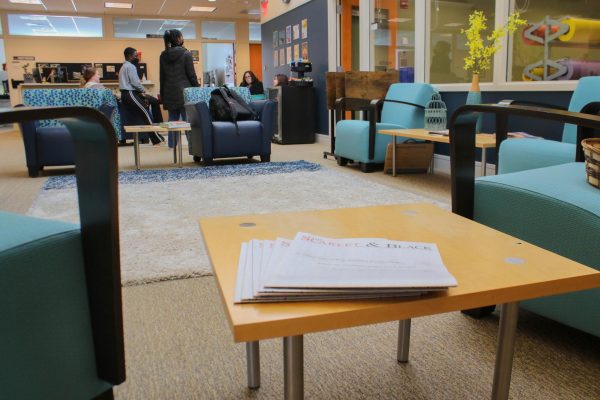College rejects UGSDW accusations of federal labor rights violation
Former UGSDW President Keir Hichens `22.5 spoke at the Union Kickoff Event on Aug. 27.
October 3, 2022
The Union of Grinnell Student Dining Workers (UGSDW) accused Grinnell College of a federal labor rights violation, a claim the College has rejected as a misrepresentation of existing workplace expectations.
These claims were made on the UGSDW’s website and in the Sept. 5 and 13 editions of the Worker Power newsletter distributed around campus. UGSDW alleged that changes were made to the employment agreement of Burling Library workers and Community Advisors (CAs), which they say is a violation of the National Labor Act of 1935.
This law states that an employer cannot make a unilateral change to the workplace when engaging in bargaining with a recognized union, or in the stages before engaging in bargaining unless these changes are minor.
According to the UGSDW newsletter and Executive Board Member at Large Malcolm Galpern- Levin `24, the alleged change to the library workplace involves an agreement that library workers had to sign which indicates that they will not use personal technology while on their shift.
Although library student workers signed the agreement this semester, the expectation that library workers do not use their own technology at work was already in the library workers’ handbook, according to Grinnell’s Vice President for Communications Ellen de Graffenreid.
According to de Graffenreid, the alleged violation of bargaining law did not take place because no change to employment expectations occurred.
UGSDW has also alleged that the work requirements for Community Advisors (CAs) have increased compared to the previous semester’s requirements. CAs were voluntarily recognized into UGSDW in August 2022 by the College.
Sira Nassoko `24, a CA in Cowles, said that she has noticed an increase in programming requirements since her time working as a CA during the 2021- 22 school year.
The initial programming requirements outlined in the bargaining contract were two total “active programs” in a semester. Nassoko alleged that this was changed during training week to be three total programs, and the expectations for what the programs would entail have also changed to be more intensive.
Nassoko also noticed an additional workload increase in requirements for sociograms, which are check-ins with residents that CAs are expected to do. This year, she said, there is an expectation to have a 15-minute check-in with each resident, which differs from the previous year.
The College disputes the Union’s allegations, and according to de Graffenreid, no changes to the CA work requirements occurred.
“Existing work rules were reworded and reordered for enhanced clarity and advice for remaining healthy was included. No workplace changes occurred in either example,” de Graffenreid wrote in an email to the S&B. “The College is committed to investigating any additional examples that UGSDW wishes to bring forward.”
Nassoko said she thinks this is an unfair representation of what happened.
“They sprung it on us during training, I don’t think it’s fair to say that it was just reorganized when we had no idea that that was gonna be expected of us until the week of training,” Nassoko said.
In the first issue of their newsletter, distributed on Sept. 5, UGSDW also accused the College of violating bargaining terms by withholding data about student workers on campus.
“Grinnell College has refused to provide UGSDW with a list of student workers by workplace. Every union is guaranteed this information under the National Labor Relations Act of 1935,” the first issue of the Worker Power newsletter states. “The College wants to make it as hard as possible for
us to represent every student worker!” This is a claim that the College said is a misrepresentation of the situation. Since Grinnell College is a private educational institution, the administration must follow the Family Educational Rights and Privacy Act (FERPA), which prohibits the disclosure of the information that the Union is requesting. However, as the employer in a bargaining stage with a recognized union, Grinnell College is also beholden to the National Labor Relations Act (NLRA).
“The intersection of FERPA and the NLRA — and which set of laws governs this request — is an area that is still unclear,” de Graffenreid wrote.
De Graffenreid also wrote that the College has proposed two alternative solutions to the Union: an opt-in FERPA release waiver or a campus-wide education initiative to discuss adding employment information to the directory. If employment information became a field in the directory, it would be able to be shared without violating FERPA’s information release prohibitions. However, directory information can only be disclosed if the institution informs students that their employment information would be disclosed.
“In each case the Union has refused the College’s proposed solutions and demanded the immediate release of protected student employment data,” de Graffenreid wrote. “The College is committed to transparency in how student data and private information is handled and disclosed to third parties and will not disclose protected data to the Union without student consent.”
UGSDW does not intend to file an unfair labor practice charge, according to Isaiah Gutman `23, UGSDW President. However, he said that UGSDW wants the College to cease making the alleged changes to the student workers’ contracts and communicate with UGSDW going forward.
“The College and Union agree that no unilateral changes to wages, hours, terms and conditions of employment can occur until all parties come to the collective bargaining table,” de Graffenreid wrote. “The College continues to work with supervisors through training, communication and sharing of best practices to ensure these changes do not occur.”
Editor’s Note: Isaiah Gutman is the Sports Editor for the S&B. Gutman was not involved in the writing or editing of this article.
As student workers, all staff members of the S&B will be included in future collective bargaining. The S&B remains an independent newspaper and is committed to maintaining its integrity in reporting.




























































